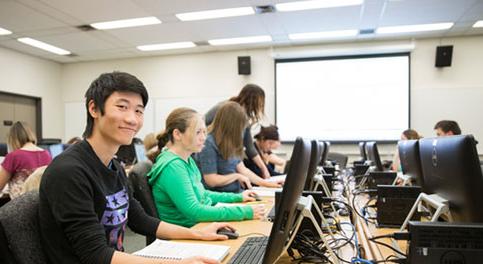
Now that you have been accepted to Butte College you are ready for the next immigration step, applying for your student (F-1) visa. In order to gain entrance into the United States, you must first obtain an F-1 student visa from an American Embassy or Consulate office.
Click to locate the nearest Embassy or Consulate office.
Once you know your SEVIS ID number you can complete the one-time fee payment of $200 to the Department of Homeland Security. Be sure to print out the receipt as you will need to provide that proof during your visa interview.
After your SEVIS fee is paid you can schedule your visa appointment. This can be done up to 90 days before the Program Start/End Date on your I-20 document. You must have your original I-20 document at your visa appointment.
Be ready to demonstrate to the Consular Officer that you will return home permanently after you complete your studies in the US. Present documents that prove you have ties to your country. "Ties" to your home country are the things that connect you to your hometown, homeland, or current place of residence such as: job, family, owning a house or apartment, financial prospects that you own or will inherit, investments, etc.
You will be expected to communicate in English as the interview will be conducted in English. Be ready and practice your English. Practicing your responses to possible questions will help you feel more at ease. If you do not understand a question that you are asked, it is ok to ask the officer to repeat. Make sure to take your time!
Family members are not preferred to join the applicants to the interview. But if you are a minor and need your parents to be there in case there are questions, like finances, then check with the consulate about the consulate's waiting area and any special rules or procedures for non-applicant family members to accompany a visa applicant.
Be ready to clearly explain why you want to come to the U.S. to study at Butte College. You are expected to explain why you chose your major and how if fits your career plans as well. If you are not able to do that, you may not succeed in convincing the consular officer that you are indeed planning to study, rather than to work or stay in the United States. Possible questions are:
Due the huge number of applications received at the Embassies and consulates, counselor officers’ end up conducting quick interviews. That being said, you will need to be brief and to the point. Remember that first impression you create are critical to your success and decisions could be made during the first couple minutes of the interview. Be positive and answer precisely to the consular officer’s questions and statements. Do not have an argument with the officer. If you are denied a student visa, ask the officer for a list of documents he or she would suggest you bring to overcome the denial and try to get the reason you were denied in writing.
Interview times are relatively short. Therefore, your supporting documents should be clear and brief. Avoid Lengthy written explanations as it cannot be evaluated fast enough. Supporting documentation will depend on your particular situation, so it is best to review the consulate’s website. However, there are a few supporting documents which are common among all students such as financial documentation, admission letter(s), and scholarship letters.
Visa processing times might vary from one country to another so the key is to plan ahead. Check with the embassy in your home country for processing times to schedule your visa interview accordingly. Take into consideration that applicants from countries having economic issues or where many students have violated the student visa regulations and remained in the US might have difficulty getting visa. Usually, these applicants will be more likely to be asked about job opportunities at home after their study in the United States. Thus, we advise our students to schedule visa interviews the earliest possible to have the time to plan for their travels and arrange their accommodation accordingly.
Remember that your main goal is to study in the US and not work! Employment is very restricted for international students. Some students work off-campus during their studies but not guaranteed. Do not talk about working before or after graduation in the United States. You must prove that you or your sponsor can support the costs of studying and living in the U.S.
If your spouse and children are remaining in your country, be prepared to explain how they will support themselves in your absence. This can be difficult to explain especially if you are the primary source of income for your family. If the consular officer gains the impression that you intend to support your family with money you may earn during your studies in the United States, your student visa application will almost certainly be denied.
Applicants must be honest! Providing false information is likely to lead to the denial of your application and will also affect your US visa applications in the future. As explained in the earlier steps, it is better to prepare for the interview as that will give you confidence. Nervousness will influence the way you answer thus will impact the judgment of the Consular officer who conducts the interview. So be honest and relax!
This list was compiled by NAFSA: Association of International Educators.
Education USA – Apply for your Student Visa
Study in the States
Content editor:
Rachel Wood
530-895-2991